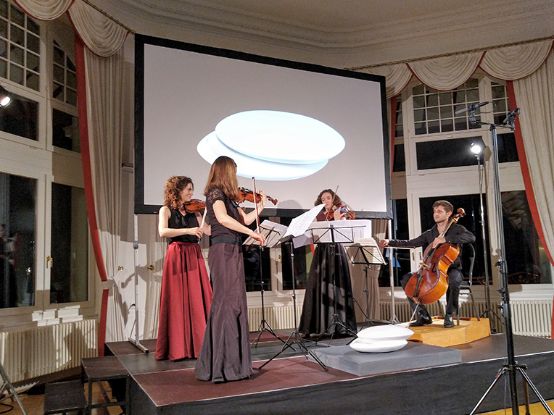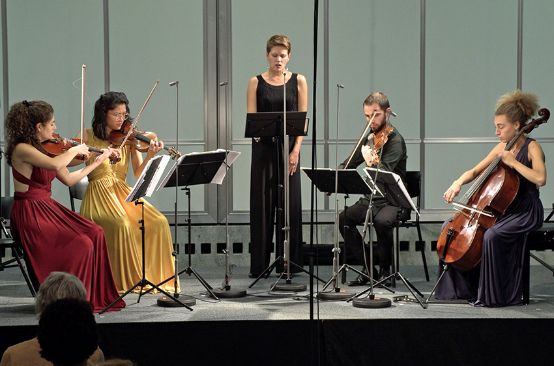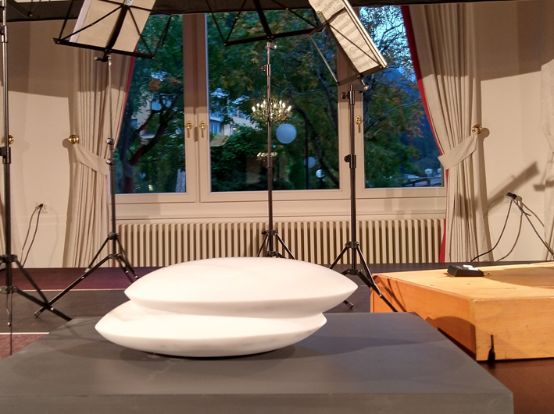News from the gold standard - string quartet premieres
Cécile Marti and Verena K. Weinmann recently presented new works for string quartet in very different settings. They also proved to be very different composer personalities.

String quartets are still the gold standard of ambitious composing. It is therefore gratifying that two new contributions to the genre by Swiss female composers were premiered within two weeks. So the highest laurels are still being reached for. It doesn't matter that both works are not quartets in the strict sense, but simply pieces for string quartet. They were presented at quartet evenings of the highest standards.
Weinmann's "agobio" and the rage
Especially the 1994 born Verena K. Weinmann found itself in respectful surroundings. Klangundszene invited visitors to the Zurich Kunsthaus under the motto "Freedom above all else" on September 25 and 26, combining a late Beethoven string quartet with one from the 20th century - and on Saturday evening with a world premiere. So it came about that Weinmann's agobio served as a prelude to Shostakovich's 8th and Beethoven's C sharp minor Quartet op. 131. Mind you, this was after Beethoven's op. 95 and Schoenberg's F sharp minor Quartet op. 10 had already been played in the afternoon. These are all legendary works that have been shrouded in myth throughout music history. And as if that were not enough agobio for voice and string quartet and thus places itself directly in the line of succession to Schönberg's op. 10, a work in which he not only violently shook the boundaries of tonality for the first time, but also broke the genre norm by adding a voice part. A few hours earlier, it had been performed by the soprano Anna Gschwend together with the Arditti Quartet was breathtaking. Incidentally, this performance was all the more astonishing given that the Ardittis had stepped in at short notice and only had one rehearsal with Anna Gschwend.
-

The Nerida Quartet with Anna Gschwend at the premiere of "agobio". Photo: Klangundszene
The composer, who lives and studies in Barcelona, confronted this difficult starting point with astonishing fearlessness and countered the works of her predecessors, which ventured into extreme regions of expression, with committed and combative music. "Agobio" means overload, excessive demands, and Weinmann, who also describes herself as an activist on her website, reacts aggressively to the feelings described in Ana Martinez Quijano's poem. In the program booklet, she writes of anger.
The strings usually play "transitions": those between different playing techniques on one pitch or those between pitches, i.e. glissandi. The result is a constant restlessness and sounds whose most prominent characteristic is a signal effect. The text is predominantly declaimed to this music on alert, even if the transitions between the many different expressive spectrums of the voice are again fluid. Additional spoken interjections by the instrumentalists give the impression of witnessing a self-conjuration that becomes more and more intense as it progresses, without ever being resolved. A haunting piece, which was written by the still young Nerida Quartet and again Anna Gschwend was impressively realized.
Marti's "ellipse" and the shape
Of a completely different temperament Cécile Marti in Ellipse for string quartet, and this also applies to the event at which her new piece was presented. Ellipse was commissioned by the Othmar Schoeck Festival (OSF) was created in Brunnen and premiered there on September 11 as part of a concert with works by Arthur Honegger, Richard Flury and, of course, Othmar Schoeck.
So while Verena K. Weinmann had to assert herself in the midst of former neo-toners, Marti's piece resounded between three Swiss composers who never functioned as the spearhead of the avant-garde. Of course, Honegger is now regarded as a modern classic, but his modernity was more that of a cheeky pluralist. And while Richard Flury at least scratched the boundaries of tonality in some works, Schoeck remained a late Romantic through and through throughout his life.
Interestingly, Flury's 1st String Quartet, the youngest of these three composers born within 15 years of each other, turned out to be a late Romantic mass product, while the quartets of the other two, their second in each case, were enthusiastic. The Belenus Quartet once again proved what a great ensemble it has developed into in recent years. In the case of Schoeck in particular, its captivating performance made it clear why many composers from this generation, who used to be decried as backward, are now experiencing a revival.
-

Cécile Marti carved the ellipse sculpture in white marble. Photo: OSF
For the fine sounds of Martis Ellipse In any case, the arrangement was a stroke of luck. For where Weinmann relies on the immediate effect of sound, Marti, who also works as a sculptor, trusts in the effect of carefully designed form processes and made this unmistakably clear with her choice of title. An image projection, in which a rough stone was turned into a sculpture, underlined this interest in form in the most general sense. It is not a work that immediately grabs you. Rather, it invites you to follow its course. To discover how the simple motif wanders through the instruments and through time. How it and the whole music returns again and again, slowing down and speeding up again, compressing and stretching.
A journey that one would like to undertake again afterwards. Particularly because the previously constant presence of the simple motif is only broken with its prominent appearance at the end of Ellipse really become aware of it. The second time you would certainly be more attentive ...
A project for 2022 is in preparation
https://schoeckfestival.ch
The next festival will take place in Brunnen from September 9 to 11, 2022.
"Drama and opera"








